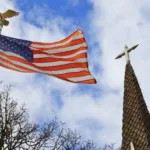Advocacy by the anti-Israel Boycott, Divestment and Sanctions (BDS) movement has contributed to some legislative wins for them and corresponding pushback by the lone Middle East democracy this summer.
Anti-Israel activist groups, including Liberation Theology group Friends of Sabeel North America (FOSNA) have touted resolutions passed by the United Church of Christ (UCC), Christian Church (Disciples of Christ) and Mennonite Church USA. Soon after, five members of an interfaith delegation – including a Presbyterian Church (USA) official – were denied entry into Israel, a ban that they claimed was a direct result of their BDS advocacy.
“We ask Everence [the Mennonite financial services organization], on behalf of Mennonite Church USA, to periodically convene representatives of Mennonite related organizations and agencies involved in the region, in order to share counsel and review investment practices for the purpose of withdrawing investments from companies that are profiting from the occupation,” the Mennonite resolution, passed July 6 at the denomination’s Orlando, Florida convention, reads. “We urge all Mennonite Church USA agencies, related organizations, and members to similarly review their investments.”
BDS activists typically call for divestment from Motorola Solutions, Hewlett-Packard, and Caterpillar, among other companies that sell non-lethal products to the Israeli military.
“The resolution, built on a restorative justice framework, calls for divestment from companies that profit from Israel’s occupation, encourages intentional education and advocacy efforts in support of Palestine including individual boycotts, and denounces Israel’s military occupation of Palestine,” wrote FOSNA National Organizer Rochelle Watson in an e-mail to supporters about the Mennonite Church legislation.
Resolutions from all three denominations single out Israel for condemnation but say little – if anything – about violence against Christians and other religious minorities in the Middle East. This was not the first time the Mennonite body had considered a BDS resolution, voting in 2015 to delay action in favor of further study. The 2017 resolution added language addressing the issue of Christian antisemitism.
The nearly identical UCC and Disciples resolutions call to “Advocate for the Rights of Children Living Under Israeli Military Occupation” and tilt heavily towards the Palestinian cause, but do not appear to constitute a significant policy change in those U.S. denominations.
“How can we be paying an incredibly high amount of tax dollars to a country that values the torturous interrogation of children?” a youth delegate to the UCC General Synod alleged during a floor speech in favor of the resolution on July 2 in Baltimore, Maryland.
The resolutions garnered swift condemnation from Jewish groups, including the American Jewish Committee (AJC).
“It is deeply disappointing that the Disciples of Christ denomination has adopted the path dictated by the discredited BDS movement, attributing to Israel sole responsibility for failing to end the conflict and casting spurious allegations of human rights violations upon Israel,” said Rabbi Noam Marans, AJC Director of Interreligious and Intergroup Relations. “People of good will should be encouraging negotiations between Israel and the Palestinians leading to a two-state solution, not offering transparently lopsided indictments of Israel that lead nowhere.”
BDS activists successfully worked to pass resolutions in the Presbyterian Church (PCUSA) in 2014 and United Church of Christ (UCC) in 2015 that instruct their respective pension boards to divest from a series of companies which do business with Israel. Subsequent efforts to leverage those victories into further action in other historic Mainline Protestant churches have not yet born fruit.
The United Methodist Church killed a BDS proposal in committee at its 2016 General Conference, with delegates instead voting to encourage church boards and agencies to end their affiliation with the U.S. Campaign to End the Israeli Occupation, a BDS-promoting organization. The year before, the Episcopal Church similarly declined to pursue three BDS proposals.
The PCUSA divestment action appears to have had consequences: Israel’s parliament passed legislation earlier this year barring entry to non-citizens who publicly support a boycott of Israel or are employed by an organization that does.
Last week, a former moderator of the Presbyterian Church (USA) General Assembly was denied entry into Israel according to a report from the Presbyterian News Service (PNS). The entry ban prevented Rick Ufford-Chase and four other interfaith officials from boarding a flight from Washington, D.C. to Tel Aviv.
“We suspect that we were the first to feel the impact of the Knesset’s [Israel’s Parliament] recent declaration that they will deny entry for anyone who has supported nonviolent strategies to force Israel to end the occupation,” The former General Assembly Moderator told Rick Jones of the Presbyterian News Service.
Israeli Interior Minister Aryeh Deri said in a statement to the Associated Press that the five had a long record of advocacy for the BDS movement.
In Presbyterian polity, a moderator is the highest elected official and presides over the General Assembly. Moderators are distinct from permanent staff with the Office of the General Assembly, which includes a Stated Clerk who functions as a denominational executive between biannual assemblies.





Comment by Dan Skogen on August 1, 2017 at 5:42 pm
Time to Ban Evangelical Lutheran Church in America pastors and bishops. See – http://www.exposingtheelca.com/exposed-blog/anti-semitism-reigns-in-the-elca-two-elca-votes-urge-an-end-to-us-aid-to-israel-and-for-a-divestment-plan-aimed-at-israel
Comment by Stanley Scism on August 4, 2017 at 5:46 pm
If a person publishing remarks critical of Buddhism then sought entry into Sri Lanka, or a person derogatory of Islam then sought entry in Saudi Arabia, or a person insulting Hinduism sought entry into India, he should expect to not be admitted if the government knew about his remarks. The same is true in most nations for prospective visitors who insult their government. Therefore the PCUSA should not be surprised at their rejection. Because of their obsession on this subject, good men like John Ortberg left the PCUSA.
Comment by Richard Bell on August 4, 2017 at 8:09 pm
Not one of the five that Israel excluded is publishing remarks critical of Judaism or derogating Judaism or insulting Judaism (or disparaging any other religion).
It may be that Ceylon and Saudi Arabia and India all exclude prospective visitors who insult their respective governments. Israel has joined them. In doing so, Israel has left the society of nations like the United States — nations that do not exclude prospective visitors because of insults to their governments.
Comment by Donald on August 5, 2017 at 5:57 am
Richard – You should be proud that these prophetic disciples are now being given the opportunity to suffer for their stance of “speaking truth to power!”
Comment by Richard Bell on August 6, 2017 at 12:27 am
Yes, I am sure they are speaking God’s truth to the ungodly power of the state of Israel. As for their suffering, well, they were only denied permission to enter the territory of that state. I pray that all God’s prophets suffer so little.
Comment by Frank McGowan on August 7, 2017 at 10:01 am
Why should any nation permit entry for any reason to those who are actively seeking to do it harm? Would invite into your home a person actively engaged in driving you to bankruptcy? Someone who wanted to bind your hands while you fight for your life?
I would not and I don’t think any other sane person would, either.